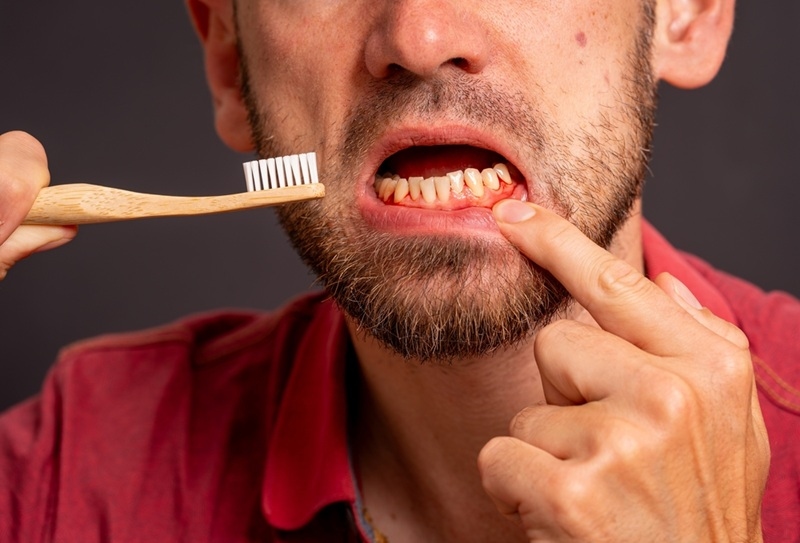
The function of your gums is crucial for promoting and preserving the health and longevity of your teeth, but it often goes unnoticed. Mid-stage gum disease can be diagnosed early, which in turn can benefit your smile by preventing the periodontal disease from becoming irreversible. Symptoms that you may experience and that may indicate early stages of gum disease include gum inflammation, bleeding gums, or swollen gums; any of these symptoms may indicate a problem with your oral health and overall health as well. Identifying symptoms and understanding the following steps can lead to improved gum health and lower the risk of future complications.
Gum disease, or periodontal disease, is an infection of the tissues that support your teeth. It typically begins with plaque buildup at the gumline, resulting in irritation and inflammation. When left untreated, it can progress from mild gum inflammation to more serious bone and tooth loss.
Gum disease often develops without noticeable symptoms. Most people are unaware they have a problem until it has progressed to an advanced stage. Recognizing the symptoms of gum disease early will help prevent its progression into irreversible damage.
Gingivitis, or early gum disease, can generally be reversed if treated properly. Recognizing these initial warning signs is essential in maintaining a healthy gum environment.
If you notice and treat these gum disease symptoms promptly, you should be able to prevent any progression into a more severe periodontal disease.
Gum inflammation develops when plaque and bacteria irritate the soft gum tissue around your teeth. At first, it may seem inconsequential, but chronic gum inflammation can destroy the tissues that surround and support your teeth.
To treat and prevent inflammation properly, you can:
If left unattended, gum inflammation can lead to irreversible damage to the tissue and teeth. Regular dental care and proper hygiene are the most effective ways to prevent further issues.
Noticing blood when brushing or flossing can be disconcerting, but bleeding gums are a prevalent symptom of gum disease. They are often caused by poor oral hygiene, including the accumulation of plaque around the gum line. If you find your gums bleeding when brushing:
Occasional bleeding may not seem like a significant issue. Chronic bleeding gums are a sign of infection and require professional help to maintain gum health.

When it comes to periodontal disease or infection, swollen gums are a visible sign as well. Generally, swollen gums are red, tender, and puffy, which can make eating and brushing painful. Gum swelling is often the result of plaque, vitamin deficiencies, or dental appliances that do not fit well.
To relieve swollen gums and keep things comfortable, you can:
If the gums remain swollen, it may indicate a more serious gum infection that needs to be treated as soon as possible to prevent bone loss.
Suppose you do not seek treatment for early gum disease. In that case, it can eventually develop into periodontal disease, a more advanced infection that affects the bone and supporting tissues under your teeth. Periodontal disease can lead to significant discomfort, loose teeth, and ultimately, tooth loss.
Common indicators of advanced periodontal disease are:
Advanced gum disease doesn't just impact your oral health; it can also affect your overall health. Research has shown that chronic gum inflammation is also linked to diabetes and heart disease, making it all the more reason to practice good oral hygiene.
Preventing gum disease starts with consistent care and awareness. Healthy gums should be firm, pink in color, and not bleed easily. If you want to maintain healthy gums for the long haul, be sure to put these daily habits into practice:
While these may sound easy to do, when performed consistently, they will lead to a dramatic reduction in your risk of developing symptoms of gum disease or swollen gums.
Your everyday choices significantly impact how your gums respond to bacteria and irritation. Even with proper brushing and flossing, certain habits can undermine your efforts.
Avoid these behaviors to protect your gum health:
Simple lifestyle changes can strengthen your immune defenses and keep gum inflammation under control.
If you notice any of the signs, including persistent gum bleeding, pain, or swelling, schedule an appointment with your dentist. If you seek treatment early enough, you can prevent a minor issue from developing into advanced periodontal disease.
Your dentist may provide:
If you postpone, gum disease may worsen and irreversibly affect your gingiva. Receiving adequate dental treatment promptly can restore the balance and comfort of your mouth.
Along with professional care, some gentle home remedies can support your gum health:
These remedies are supportive but not substitutes for proper dental treatment. Please always consult a dentist if you have any symptoms.
Healthy gums are essential for a confident smile and lasting oral wellness. Recognizing gum disease symptoms early—such as bleeding gums, swollen gums, or persistent gum inflammation—helps prevent severe periodontal disease. With consistent care, good hygiene, and professional support, you can protect your gum health for life.
This content was created by AI